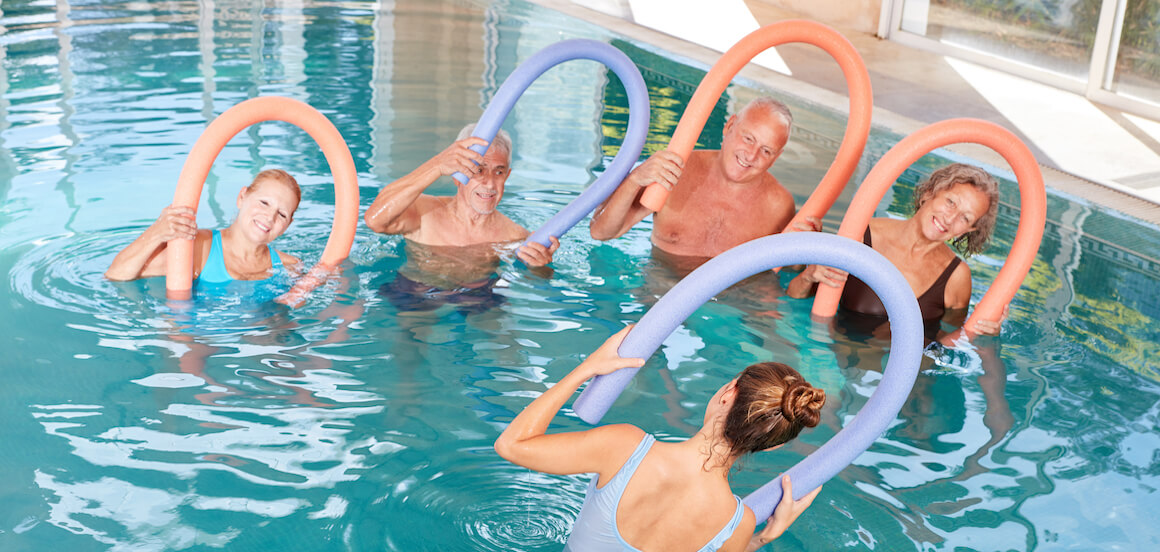
Aquatic Exercise and the Importance of Physical Wellness for Seniors
August 14, 2020 | Wellness
Take a minute to think about everything you do in one single day – from the moment you wake up to the time you go to bed. Maybe you start your day with a morning walk around your neighborhood or with a light workout. Perhaps you spend your afternoon tending to your garden and end your day meeting family for dinner. No matter what activities fill your day, chances are your daily activities include a lot of movement. To keep up with your independent lifestyle, it’s important to take good care of your physical wellness.
Aquatic Exercise to Maintain Your Physical Wellness
When you take care of your body with proper exercise, you can reduce your risk of illness and decrease your likelihood of falls and fall-related injuries. One way to actively improve your overall levels of physical wellness is to make exercise a regular part of your daily routine.
A great activity to help boost your physical wellness is working out in the water, be it through traditional swimming, aquatic exercises, or adapting your current exercise routine for the water. Aquatic exercise not only helps you stay in shape, but it also offers many other benefits including strengthening your muscles and improving your range of flexibility.
5 Benefits of Aquatic Exercise for Seniors
According to Katie Jackson, PT, DPT at CC Young, swimming and water exercise are great for people of all ages. However, it’s particularly advantageous to older adults because of its physical and mental benefits.
- Maintain Muscle Strength. As reported in Sports Medicine Journal (2004), adults 50-80 years old will, on average, lose 30-40% of muscle mass as part of the aging process. Decreased muscle strength can lead to falls, fractures and injuries. Aquatics exercise is so beneficial because it uses water resistance to strengthen and develop muscle strength while putting less stress on your joints.
- Reduces Pain. A common ailment seniors experience is stiff joints and joint pain, especially in the knees and hips. Research shows that aquatic exercise can be highly effective at reducing pain for adults with arthritic and other disabilities. Any exercise you do on land is weight-bearing, meaning you feel the full weight of your body while working out. Swimming, on the other hand, is not. With swimming, the water makes the body buoyant and eliminates the pressure on your joints.
- Increases Cardiovascular Endurance. Research shows that aquatic exercise can help increase your cardiovascular endurance and strengthen muscles. As your muscles become stronger over time, aquatic exercise can also help control body weight when you make it a regular part of your routine.
- Improves Flexibility and Coordination. Having good mobility and range of motion is important because it allows you to move independently. Flexibility is a necessary component to maintaining your balance and reducing your risk of falls. Research shows that participating in regular aquatic exercise helps improve your flexibility, muscle strength for better coordination and overall balance.
- Improves Mental Health. When you take part in aquatic exercise, you’re actively working to improve your mental health. Studies show that aquatic exercise has a significant positive psychological effect on you when you make it a part of your normal fitness routine. Aquatic exercise can also help to improve your mood, sleep better and decrease levels of anxiety, helping to further strengthen your mental health.
Live an Active Lifestyle at CC Young
At CC Young, we encourage all our residents to maintain an active lifestyle. Our team members are committed to educating residents and rehabilitation patients on the importance of exercise and encourage them to make working out a part of their everyday lives.
Contact us today at 214-258-4000 to learn more about CC Young and the variety of services we offer to help keep residents healthy and active.
Go Back